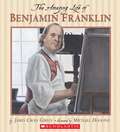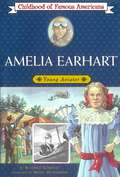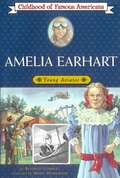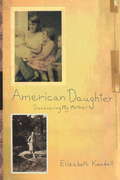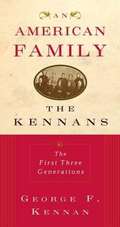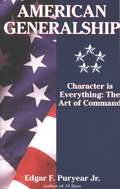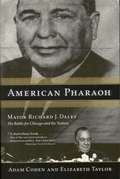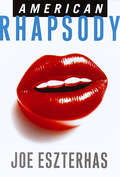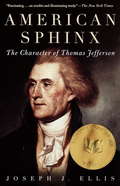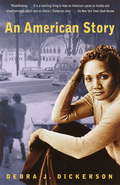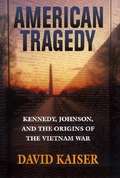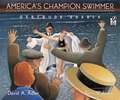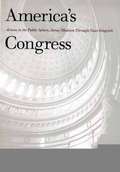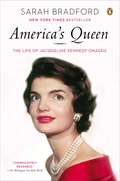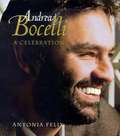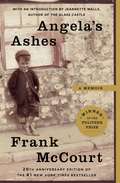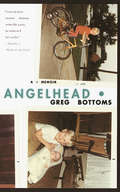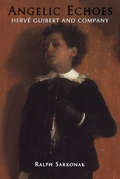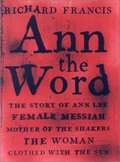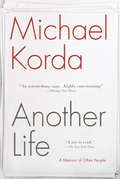- Table View
- List View
The Amazing Life of Benjamin Franklin
by James Cross Giblin Michael DoolingNow available in paperback for the first time, James Cross Giblin and Michael Dooling tell the story of the man known as the "wisest American. " Benjamin Franklin was one of seventeen children, and the youngest of 10 sons. To help out with the family, he was put to work when he was 10 years old in his father's candle and soap-making shop. Ben hated making soap and candles. Since he was smart and a good speller and he loved to read, he later went to work in his brother's print shop as an apprentice. He read book after book, and soon began to write himself. By 18, he moved to Philadelphia where he eventually openend his own print shop. By age 28 he published "Poor Richard's Almanac," a best seller in Colonial America.
Amelia Earhart: Young Aviator
by Meryl Henderson Beatrice GormleyUsing simple language that beginning readers can understand, this lively, inspiring, and believable biography looks at the childhood of Amelia Earhart. Illustrated throughout.
Amelia Earhart: Young Aviator (Childhood of Famous Americans Series)
by Beatrice GormleyWhat was Amelia Earhart like as a child and teenager? A fictionalized biography of the famous aviatrix.
America in the Time of Franklin Delano Roosevelt, 1929-1948
by Sally Senzell Isaacs<P>America in the Time of... helps readers explore our nation's past by focusing on key figures in history. Each visually stunning spread features clearly written text that explains the social, political, and economic realities of the time. The series visits all areas of the United States from coast to coast, and offers information about the native as well as invading and immigrant peoples. Each book features: <br>-- beautiful reconstruction artwork, <br>-- authentic primary source photographs, <br>-- detailed maps, both modern and historical, <br>-- profiles of famous people who shaped that time, <br>-- a list of noteworthy places, and <br>-- a bibliography of fiction books to extend learning.
America in the Time of Martin Luther King Jr. (1948-1976)
by Sally Senzell IsaacsAmerica in the Time of is a series of nine books arranged chronologically, meaning that events are described in the order in which they happened. In each book, most articles deal with a particular event or part of American history. This book is about America from 1948 to 1976.
America in the Time of Susan B. Anthony
by Sally Senzell IsaacsUses the life of Susan B. Anthony as a reference to examine the development of the United States from 1845 to 1928.
America In The Time Of Abraham Lincoln: 1815 to 1869
by Sally Senzell IsaacsUses the life of Abraham Lincoln as a reference to examine the history of the United States from 1815 to 1869.
American Daughter
by Elizabeth KendallIn this beautifully crafted book, Elizabeth Kendall tells the story of a family, of a passionate attachment between a mother and a daughter and the sudden tragedy that tears it apart. American Daughter is also a brilliant portrait of wellborn women's lives in cities and towns in the post-World War II era, as Kendall evokes how difficult it was to become anything other than an American daughter, which meant being a dependent woman. Occupying a coveted place in St. Louis's privileged high society, Henry and Betty Kendall seemed to be the American dream come true: six children, a sprawling house, a legacy of higher education at Harvard and Vassar. Yet underneath lay the flawed marriage of an idealistic young woman who made her eldest daughter her best friend and turned civil rights into her salvation. Elizabeth maintained the family silence as eccentricities began to appear in her father's behavior, along with whispers of financial difficulties. She accompanied her mother back to Vassar for a summer program on the home and family, then came into her own, away from her family, at the haven of a girls' summer camp and at Radcliffe. From the war-torn 1940s, when young men in uniform, home on leave, went to debutante parties, through the seismic social changes of the 1960s, Kendall tells the intertwined story of her mother and herself, of their powerful bond and how both shaped their lives in response to it. Unrelentingly honest, rich with humor and insights into families and women's lives, American Daughter is both a poignant portrait of American life at the middle of the twentieth century, and a dual coming-of-age story of a mother and a daughter, united by commitment and love, separated by a fatal accident-and by the vastly different birthrights of their generations.From the Hardcover edition.
An American Family: The Kennans, The First Three Generations
by George F. KennanPulitzer Prize-winning author and former statesman George F. Kennan traces his roots back more than five generations, discovering in the process a family history with all the makings of a classic American story.
American Generalship: Character Is Everything: The Art of Command
by Edgar PuryearAmerica's top military leaders are scrutinized as Puryear ponders what prepared our generals for the terrible responsibilities they bore during World War II, Korea, Vietnam, the Gulf War and on to today.
American Pharaoh: His Battle for Chicago and the Nation
by Elizabeth Taylor Adam CohenYou might say it took a village to raise this child. Richard Daley and Chicago are inseparable, and it's impossible to discuss one without at least mentioning the other. Consequently, American Pharaoh includes far more material than your average biography; this is as much the story of the city as it is of the man. Covering the years between 1902 and 1976 (that is, between Daley's birth and death), authors Adam Cohen and Elizabeth Taylor show us a life that in some ways symbolizes the American dream: a boy from a poor neighborhood grows up to wield unimaginable power, yet never forgets his roots. But Daley's was a complicated legacy. While filling Chicago with modern architecture and affecting national politics, he was also held responsible for the segregation and police brutality that tore the city apart during the late '60s and early '70s. Throughout the book, Cohen and Taylor remind readers that Daley's real influence came from the powerful political machine he created. When he didn't like guidelines from national agencies, for example, he went directly to the presidents he helped get elected. When he got bad local press, people lost their jobs and his neighbors marched in his support. When Martin Luther King Jr. came to town, he was greeted by a handpicked organization of African American leaders with strong ties to Daley's machine. It's startling to remember that this was simply a local office; the mayor's loyalties and prejudices affected the entire country. American Pharaoh shows politics at its deepest level, and each chapter brings new insights into a complex man and the system he created in order to rule the city that made him. --Jill Lightner
American Rhapsody
by Joe EszterhasIf the Watergate scandal was a previous generation's National Nightmare, then maybe the Clinton scandal was our National Wet Dream, and who better to narrate it than the screenwriter Joe Eszterhas? In American Rhapsody, Eszterhas, whose credits include Basic Instinct and Showgirls, and Charlie Simpson's Apocalypse, for which he was nominated for a National Book Award, takes us through the events that threatened to topple a president and left most of the nation's citizens with, at the very least, a bad taste in their mouths. Taking full advantage of his considerable journalistic and storytelling talents, Eszterhas gives us every fact, rumor, or innuendo surrounding the president's foibles in the context of late century American politics and entertainment. Here Washington and Hollywood do more than just flirt with each other; they share the same bed. From scandalmongers Matt Drudge (who began as a Hollywood gossip) and Ken Starr, to would-be president paramours Sharon Stone and Barbra Streisand, to his final, unimpeachable witness, Willard--none other than President Clinton's talking penis--Eszterhas gives us the goods on the story that nobody could stop talking about and, thanks to American Rhapsody, will be impossible to think about the same way again.From the Trade Paperback edition.
American Sphinx: The Character of Thomas Jefferson (American History Ser.)
by Joseph J. EllisFor a man who insisted that life on the public stage was not what he had in mind, Thomas Jefferson certainly spent a great deal of time in the spotlight--and not only during his active political career. After 1809, his longed-for retirement was compromised by a steady stream of guests and tourists who made of his estate at Monticello a virtual hotel, as well as by more than one thousand letters per year, most from strangers, which he insisted on answering personally. In his twilight years Jefferson was already taking on the luster of a national icon, which was polished off by his auspicious death (on July 4, 1826); and in the subsequent seventeen decades of his celebrity--now verging, thanks to virulent revisionists and television documentaries, on notoriety--has been inflated beyond recognition of the original person.<P><P> For the historian Joseph J. Ellis, the experience of writing about Jefferson was "as if a pathologist, just about to begin an autopsy, has discovered that the body on the operating table was still breathing." In American Sphinx, Ellis sifts the facts shrewdly from the legends and the rumors, treading a path between vilification and hero worship in order to formulate a plausible portrait of the man who still today "hover[s] over the political scene like one of those dirigibles cruising above a crowded football stadium, flashing words of inspiration to both teams." For, at the grass roots, Jefferson is no longer liberal or conservative, agrarian or industrialist, pro- or anti-slavery, privileged or populist. He is all things to all people. His own obliviousness to incompatible convictions within himself (which left him deaf to most forms of irony) has leaked out into the world at large--a world determined to idolize him despite his foibles.<P> From Ellis we learn that Jefferson sang incessantly under his breath; that he delivered only two public speeches in eight years as president, while spending ten hours a day at his writing desk; that sometimes his political sensibilities collided with his domestic agenda, as when he ordered an expensive piano from London during a boycott (and pledged to "keep it in storage"). We see him relishing such projects as the nailery at Monticello that allowed him to interact with his slaves more palatably, as pseudo-employer to pseudo-employees. We grow convinced that he preferred to meet his lovers in the rarefied region of his mind rather than in the actual bedchamber. We watch him exhibiting both great depth and great shallowness, combining massive learning with extraordinary naïveté, piercing insights with self-deception on the grandest scale. We understand why we should neither beatify him nor consign him to the rubbish heap of history, though we are by no means required to stop loving him. He is Thomas Jefferson, after all--our very own sphinx.<P> Winner of the National Book Award
An American Story
by Debra J. DickersonA profoundly courageous and insightful memoir, An American Story documents the events that have shaped journalist Debra Dickerson's conscience.The daughter of former sharecroppers, Dickerson never imagined she would emerge from her squalid St. Louis neighborhood to become an acclaimed journalist with a Harvard Law degree. A constant reader and a straight-A student, nevertheless Dickerson's lack of confidence kept her from accepting the many colleges offers she received. Instead she enlisted in the U.S. Air Force, quickly rising through the ranks. In spite of her success, she recognized within herself deep-seated conflict at being a working class black woman living in a white man's world. Her path to self-acceptance is at the heart of this refreshing narrative.From the Trade Paperback edition.
American Tragedy: Kennedy, Johnson, and the Origins of the Vietnam War
by David E. KaiserFought as fiercely by politicians and the public as by troops in Southeast Asia, the Vietnam War--its origins, its conduct, its consequences--is still being contested. In what will become the classic account, based on newly opened archival sources, David Kaiser rewrites what we know about this conflict. Reviving and expanding a venerable tradition of political, diplomatic, and military history, he shows not only why we entered the war, but also why our efforts were doomed to fail. American Tragedy is the first book to draw on complete official documentation to tell the full story of how we became involved in Vietnam--and the story it tells decisively challenges widely held assumptions about the roles of Eisenhower, Kennedy, and Johnson. Using an enormous range of source materials from these administrations, Kaiser shows how the policies that led to the war were developed during Eisenhower's tenure and nearly implemented in the closing days of his administration in response to a crisis in Laos; how Kennedy immediately reversed course on Laos and refused for three years to follow recommendations for military action in Southeast Asia; and how Eisenhower's policies reemerged in the military intervention mounted by the Johnson administration. As he places these findings in the context of the Cold War and broader American objectives, Kaiser offers the best analysis to date of the actual beginnings of the war in Vietnam, the impact of the American advisory mission from 1962 through 1965, and the initial strategy of General Westmoreland. A deft re-creation of the deliberations, actions, and deceptions that brought two decades of post-World War II confidence to an ignominious end, American Tragedy offers unparalleled insight into the Vietnam War at home and abroad--and into American foreign policy in the 1960s.
America's Champion Swimmer: Gertrude Ederle
by David A. Adler Terry WidenerTrudy Ederle loved to swim, and she was determined to be the best. At seventeen Trudy won three medals at the 1924 Olympics in Paris. But what she planned to do next had never been done by a woman: She would swim across the English Channel in fourteen hours and set a world record.
America's Congress: James Madison Through Newt Gingrich
by David R. MayhewTo understand American politics and government, we need to recognize that members of Congress are more than agents of societal interests and preferences -- they also act with some autonomy and consequence in the public sphere. In this illuminating book, a distinguished political scientist examines the actions of members of Congress throughout American history, assessing their patterns and importance and their role in the U. S. system of separation of powers.
America's Queen: The Life of Jacqueline Kennedy Onassis
by Sarah BradfordAcclaimed biographer Sarah Bradford explores the life of Jacqueline Kennedy Onassis, the woman who has captivated the public for more than five decades, in a definitive portrait that is both sympathetic and frank. With an extraordinary range of candid interviews--many with people who have never spoken in such depth on record before--Bradford offers new insights into the woman behind the public persona. She creates a coherent picture out of Jackie's tumultuous and cosmopolitan life--from the aristocratic milieu of Newport and East Hampton to the Greek isles, from political Washington to New York's publishing community. She probes Jackie's privileged upbringing, her highly public marriages, and her roles as mother and respected editor, and includes rare photos from private collections to create the most complete account yet written of this legendary life.
America's Queen: The Life of Jacqueline Kennedy Onassis
by Sarah BradfordAcclaimed biographer Sarah Bradford explores the life of Jacqueline Kennedy Onassis, the woman who has captivated the public for more than five decades, in a definitive portrait that is both sympathetic and frank. With an extraordinary range of candid interviews--many with people who have never spoken in such depth on record before--Bradford offers new insights into the woman behind the public persona. She creates a coherent picture out of Jackie's tumultuous and cosmopolitan life--from the aristocratic milieu of Newport and East Hampton to the Greek isles, from political Washington to New York's publishing community. She probes Jackie's privileged upbringing, her highly public marriages, and her roles as mother and respected editor, and includes rare photos from private collections to create the most complete account yet written of this legendary life.
Andrea Bocelli: A Celebration
by Antonia FelixThe author presents text and pictures from Andrea Bocelli's life. Information concerning how different conductors worked with Andrea as he made his entrance in the opera are included.
Angela's Ashes: A Memoir (Scholastic Elt Readers Ser.)
by Frank Mccourt"When I look back on my childhood I wonder how I managed to survive at all. It was, of course, a miserable childhood: the happy childhood is hardly worth your while. Worse than the ordinary miserable childhood is the miserable Irish childhood, and worse yet is the miserable Irish Catholic childhood." So begins the luminous memoir of Frank McCourt, born in Depression-era Brooklyn to recent Irish immigrants and raised in the slums of Limerick, Ireland. Frank's mother, Angela, has no money to feed the children since Frank's father, Malachy, rarely works, and when he does he drinks his wages. Yet Malachy -- exasperating, irresponsible and beguiling-- does nurture in Frank an appetite for the one thing he can provide: a story. Frank lives for his father's tales of Cuchulain, who saved Ireland, and of the Angel on the Seventh Step, who brings his mother babies. Perhaps it is story that accounts for Frank's survival. Wearing rags for diapers, begging a pig's head for Christmas dinner and gathering coal from the roadside to light a fire, Frank endures poverty, near-starvation and the casual cruelty of relatives and neighbors--yet lives to tell his tale with eloquence, exuberance and remarkable forgiveness. Angela's Ashes, imbued on every page with Frank McCourt's astounding humor and compassion, is a glorious book that bears all the marks of a classic.<P><P> Pulitzer Prize Winner
Angelhead: My Brother's Descent into Madness
by Greg BottomsA taut, powerful memoir of madness, Angelhead documents the violent, drug-addled descent of the author's brother, Michael, into schizophrenia. Beginning with Michael's first psychotic break--seeing God in his suburban bedroom window while high on LSD--Greg Bottoms recounts, in gripping, dramatic prose, the bizarre disappearances, suicide attempts, and the shocking crime that land Michael in the psychiatric wing of a maximum security prison. A work of nonfiction with the form and imagery of a novel, Angelhead enables the reader to witness not only the fragmenting of a mind, but of a family as well. "A tour-de-force memoir. . . . Bottoms writes like a poet, he writes like he is on fire." --Esquire, Book of the Year, 2000. "Angelhead is a brilliant, albeit inconceivably sad book. The fact that Bottoms survived the ordeal is incredible. But the fact that he could write about it with such pathos and insight is nothing less than extraordinary. "--Atlanta Journal-Constitution. "Greg Bottoms has provided a biographical novel about his brother that may be as close as most of us will ever get to knowing what it is to be truly mad. Angelhead is a story nearly as terrifying as the disease it describes. "--Psychology Today.
Angelic Echoes: Hervé Guibert and Company
by Ralph SarkonakIn 1990 Hervé Guibert gained wide recognition and notoriety with the publication of "À l'ami qui ne m'a pas sauvé la vie (To the Friend Who Did Not Save My Life)". This novel, one of the most famous AIDS fictions in French or any language, recounts the battle of the first-person narrator not only with AIDS but also with the medical establishment on both sides of the Atlantic. Photography critic for Le Monde from 1977-1985, Guibert was also the co-author (with Patrice Chéreau) of a film script, L'Homme Blessé, which won a César in 1984, and author of more than twenty-five books, eight of which have been translated into English. In this vibrant and unusual study, Ralph Sarkonak examines many intriguing aspects of Guibert's life and production: the connection between his books and his photography, his complex relationship with Roland Barthes and with his friend and mentor Michel Foucault (relationships that were at once literary, intellectual, and personal in each case); the ties between his writing and that of his contemporaries, including Renaud Camus, France's most prolific gay writer; and his development of an AIDS aesthetic. Using close textual analysis, Sarkonak tracks the convolutions of Guibert's particular form of life-writing, in which fact and fiction are woven into a corpus that evolves from and revolves around his preoccupations, obsessions, and relationships, including his problematic relationship with his own body, both before and after his HIV-positive diagnosis. Guibert's work is a brilliant example of the emphasis on disclosure that marks recent queer writing – in contrast to the denial and cryptic allusion that characterized much of the work by gay writers of previous generations. Yet, as Sarkonak concludes, Guibert treats the notions of falsehood and truth with a postmodern hand: as overlapping constructs rather than mutually exclusive ones – or, to use Foucault's expression, as "games with truth."
Ann the Word: The Story of Ann Lee, Female Messiah, Mother of the Shakers, the Woman Clothed with the Sun
by Richard FrancisFrom Publishers Weekly Ann Lee (1736-1784) was an illiterate who left no records of her own, making the biographer's task a challenge. Francis has culled this entertaining profile from public records of Lee's many incarcerations for disorderly conduct (those early Shakers were a loud bunch) and her followers' glowing recollections. Francis dispels some myths about Lee, including the notion that she "founded" the Shaker movement, which had been going for 11 years before she converted in 1758. In 1770, she had a vision in which she saw herself as a Messiah figure, and thereafter assumed spiritual leadership, bringing a small flock of believers to America in 1774. Francis does a fine job of placing early Shakerism within the larger context of the Revolutionary War and gives long-overdue attention to the historical import of the "Dark Day" of 1780. Francis is a fine writer who vividly conjures the religious and social worlds of the 18th century, though his allusions to popular 20th-century entertainments (Monty Python, Stephen King and the movie Groundhog Day) are more distracting than illustrative. The lack of citations of any kind is troublesome in a biography where so much of the "primary" source material was penned long after Lee's death; occasional glitches on Francis's part (e.g., calling the Anglican revivalist George Whitefield a Methodist) also undermine reader confidence. Despite these flaws, this is unquestionably the best and most absorbing biography of the irrepressible Shaker leader.
Another Life: A Memoir of Other People
by Michael KordaIn his remarkable memoir, at once frank, audacious, canny, and revealing, Michael Korda, the author of Charmed Lives and Queenie, does for the world of books what Moss Hart did for the theater in Act One, and succeeds triumphantly in making publishing seem as exciting (and as full of great characters) as the stage.Another Life is not just an adventure--the engaging and often hilarious story of a young man making his career--but the insider's story of how a cottage industry metamorphosed into a big business, with sometimes alarming results for all concerned. Korda writes with grace, humor, and a shrewd eye, not only about himself and his rise from a lowly (but not humble) assistant editor reading the "slush pile" of manuscripts to a famous editor in chief of a major publishing house, but also about the celebrities and writers with whom he worked over four decades. Here are portraits--rare, intimate, always keenly observed--of such larger-than-life figures as Ronald Reagan, affable and good-natured but the most reluctant of authors, struggling with his "ghosted" presidential autobiography; Richard Nixon, seen here as a genial, if bizarrely detached, host; superagent Irving Lazar, pursuing his endless deals and dreams of "class"; retired Mafia boss Joseph Bonanno, the last of the old-time dons, laboring over his own version of his life in his desert retreat; Joan Crawford, giving Korda her rules for successful living; and countless other greats, near greats, and would-be greats. Here too are famous writers, sometimes eccentric, sometimes infuriating, sometimes lost souls, captured memorably by someone who was close to them for years: Graham Greene, in pursuit of his FBI file and a Nobel Prize; Tennessee Williams, wrestling unsuccessfully with his demons; Jacqueline Susann, facing and conquering the dreaded "second-novel syndrome" after the stunning success of Valley of the Dolls; Harold Robbins (who had to be guarded under lock and key and made to finish his novels), struggling to keep the IRS at bay from the deck of his yacht; Carlos Castaneda, at his most sorcerously charming, described--at last--in detail, as he really was, by one of the few people who knew him well; not to mention Richard Adams, Will and Ariel Durant, Susan Howatch, S. J. Perelman, Fannie Hurst, Larry McMurtry, and many, many more. Parts of this book that have appeared in The New Yorker over the years have brought Korda great acclaim--the chapter about Jacqueline Susann has been made into a major motion picture. Here at last, entertaining and provocative and always hugely readable, is the whole story--a book as engaging and full of life as Korda's highly acclaimed memoir of his family, Charmed Lives, about which Irwin Shaw wrote: "I don't know when I have enjoyed a book more."
